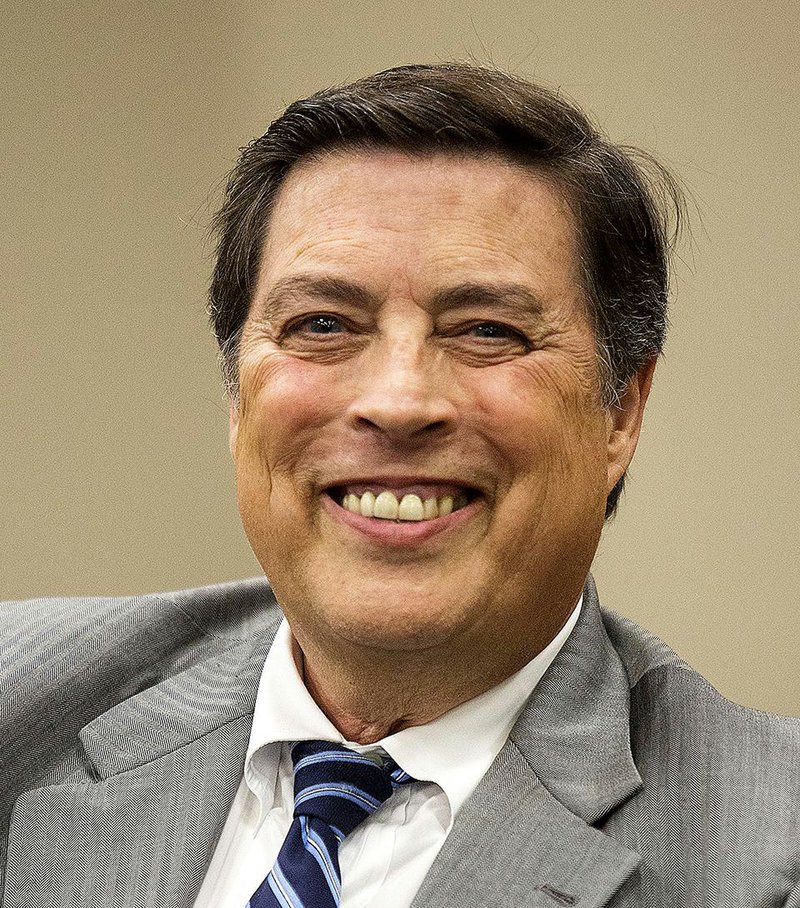Arkansas Supreme Court Chief Justice Jim Hannah, who has led the court for nearly 11 years, will resign at the end of the month.
Hannah announced Thursday that he has been "challenged by a significant health issue" over recent weeks and will resign out of his "utmost respect for my job as Chief Justice and the business of the court."
"There is no greater honor that a person can receive than to have another person place his or her trust and confidence in you," Hannah said in the written statement. "I want to thank the people of Arkansas who placed their trust and confidence in me and allowed me to serve them on their Arkansas Supreme Court."
Hannah, 70, said he plans "to focus full-time" on his "immediate health condition," but he didn't reveal what ailment he is battling.
Hannah has missed the court's past seven weekly oral arguments and declined to answer reporters' questions about his absences.
A few former and current court officials have said Hannah was suffering from severe back pain earlier in the year.
Justice Paul Danielson, who is not seeking re-election next year, said he was "saddened" by Hannah's announcement.
"He has served our state with honor and distinction. My thoughts and best wishes are with him and his family as he focuses his attention on his health and recovery," Danielson wrote. "He is a dear friend."
Brief statements from Justices Courtney Goodson, Robin Wynne and Rhonda Wood praised Hannah for his public service and offered him well wishes for the future.
Gov. Asa Hutchinson received a resignation letter from Hannah on Thursday, gubernatorial spokesman J.R. Davis said.
In a statement, the Republican governor said Hannah represents the "finest of the legal tradition."
"Even in his resignation, the Chief Justice has placed the courts and the people of Arkansas above his personal interests," Hutchinson wrote. "While I recognize this is a tough decision for him to make, he made it for the right reasons and we are forever grateful for his dedication to the rule of law."
Arkansas Attorney General Leslie Rutledge said Hannah has served with "humility and wisdom."
"Hannah consistently provided a fair and impartial approach to any question or case brought before him, and his leadership of the Court will be greatly missed," Rutledge said in a written statement.
Under Arkansas law, the governor will select Hannah's replacement.
Davis said there is no one lined up at this point to succeed Hannah. "We are literally moving forward now with the process."
Born in Long Beach, Calif., Hannah grew up in Ozark, Mo., and moved with his family to Harrison where he graduated from high school.
He attended Drury College in Springfield, Mo., along with his high school sweetheart, Pat, and the two married during his freshman year
He then transferred to the University of Arkansas at Fayetteville, where he earned a bachelor's degree. He earned his law degree from UA in 1968.
Hannah moved to Searcy, where he practiced law with the state's eventual governor, Mike Beebe. Hannah was elected as Searcy's city attorney in the early 1970s.
Hannah worked with others to form the White County Juvenile Court and its juvenile probate office, and was elected as a juvenile court judge in White County from 1976-78.
After nearly 20 years as a chancery/probate judge in the state's 17th Judicial District, Hannah, a Democrat, defeated a former corporate lawyer with ties to Wal-Mart Stores Inc. and Tyson Foods to win election to the high court bench. He joined the Supreme Court in 2000.
Amendment 80 was enacted that same year and ended partisan judicial elections in the state, making Hannah the last associate Supreme Court justice elected in a partisan race.
Former Associate Justice Bob Brown said Hannah was already well-known and respected by the time he joined the court.
"I remember being impressed when he first got on the court. He was quiet. He kind of learned the ropes, he didn't say much," Brown said. "I probably spoke way too much. ... I thought [Hannah's way] was a wise way to proceed."
In 2004, Hannah defeated former Court of Appeals judge and current Pulaski County Circuit Judge Wendell Griffen to become the state's chief justice. He succeeded Betty Dickey, who had been appointed by former Gov. Mike Huckabee to finish out the term of W.H. "Dub" Arnold.
Although Hannah is chief justice, he doesn't dominate court proceedings, Brown said.
"Jim was very respectful of other people's points of view. He didn't walk up and down the halls and lobby for votes, I don't think that's a good idea anyway," Brown said.
John DiPippa, a dean emeritus at the University of Arkansas at Little Rock's William H. Bowen School of Law, said Hannah is a sober, dedicated justice.
"What you see in Justice Hannah's legal work is very good craft and an important attention to detail," DiPippa said. "He might sacrifice an elegant statement to make sure he's got the law correct and he applies it correctly. He is very careful, very diligent and very thoughtful."
At the beginning of his tenure as the state's top judge, Hannah said his goals would be to make sure that his court kept the other branches of state government -- executive and legislative -- in check, and to try to educate the public about the judicial system.
The court began an array of outreach programs during Hannah's tenure that includes "Appeals on Wheels" in which the seven justices make regular trips to cities around the state to hear oral arguments.
In working with other state court officials, Hannah has encouraged investments in electronic filing and other technological updates.
In 2010, the Supreme Court began streaming video and audio of its oral arguments on the Internet.
DiPippa said Hannah's work to help create and promote the state's Access to Justice Commission -- aimed at helping disadvantaged Arkansans get legal aid in civil matters -- will be Hannah's "most significant" legacy.
"That's the kind of thing that will go well beyond a judge's tenure or any particular case. In that respect, he's left something for us to carry forward," DiPippa said.
Hannah also began a tradition of delivering an annual report -- called the State of the Judiciary -- at the summer meetings of the Arkansas Bar Association, although he was absent this year.
In June 2014, Hannah praised the state's nonpartisan judicial elections as better than the alternatives, but said more transparency was needed in campaign fundraising for judicial elections.
Hannah and other justices often urged lawmakers to raise the pay for judges in the state. Earlier this year, an independent citizens commission raised the pay for the state's appellate, circuit and district judges.
In his 15 years on the Supreme Court, Hannah has weighed in on myriad criminal, civil and constitutional questions.
Earlier this year, he and Danielson recused themselves from a spinoff case created to determine which justices would rule in a challenge to the state's gay marriage ban. The case had been argued in November, but no ruling had been issued. Then, the court's makeup changed with the new year, raising the question of which justices should rule in the case.
Hannah and Danielson submitted stern letters to the court, accusing fellow justices of stalling on the gay-marriage decision.
"I believe that a majority of this court has created out of whole cloth an issue to delay the disposition in [the gay- marriage challenge]," Hannah wrote.
Ultimately, the U.S. Supreme Court struck down gay marriage bans before the Arkansas justices could decide on the state law's constitutionality.
DiPippa said that though the disagreement over the gay-marriage case may have left some "acrid fumes" in the air, it should not define Hannah's career.
"It's important to recognize that courts and justices are like every other institution. They have their conflicts. What happens is we don't often see them," DiPippa said. "It's important to put [Hannah's] role in perspective. Though he may be leaving on a sour note, he's leaving with an accomplished legacy."
Hannah's replacement, whoever it is, will not be eligible to run for the chief justice spot in next year's elections. Arkansas law prohibits appointees from running for the seats to which they were appointed.
Davis, the governor's spokesman, said Hutchinson will work "quickly but efficiently" to select Hannah's replacement. He couldn't say whether a decision will be made before Hannah leaves the court.
Hannah's successor, Davis said, will "be someone who can lead, a strong leader who can make sure the court is fulfilling its duty."
Metro on 08/14/2015

